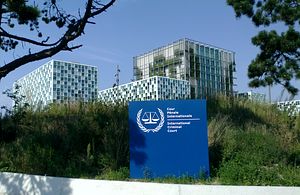The prosecutor of the International Criminal Court (ICC), Fatou Bensouda, announced on November 3 that she has decided to request authorization to investigate crimes committed in connection with the armed conflict in Afghanistan.
The Afghanistan situation has been under preliminary examination by the Office of the Prosecutor of the ICC since 2006. In her request for the Pre-Trial Chamber to authorize an investigation, the prosecutor said that there is a “reasonable basis” to think crimes against humanity and war crimes have been committed by the Taliban and Haqqani Network, while war crimes of torture and ill-treatment have been committed by Afghan government forces and the U.S. military forces deployed to Afghanistan.
In its latest report on preliminary examination activities, published in November 2016, the Office of the Prosecutor concluded that it would soon request the Pre-Trial Chamber to commence its investigation into the situation in Afghanistan. Following the release of the report, the Afghan government argued that the request to open an ICC investigation would derail the ongoing peace talks with Hezb-i-Islami. Kabul suggested the request be delayed for at least one year so that the peace deal could be concluded, and indicated Afghanistan would then be prepared to cooperate fully with the Court.
A year later, now that the prosecutor has requested authorization to open an investigation and a Pre-Trial Chamber of the Court has been assigned to decide on the matter, the likely implications for peace in Afghanistan need to addressed.
Afghanistan acceded to the ICC statute on February 10, 2003, and the Court has jurisdiction over war crimes, crimes against humanity, and the crime of genocide committed in the territory of Afghanistan or by its nationals since May 1, 2003. The Afghan government, when it suggested a delay in requesting the opening of an investigation, presented the view that peace should come first, and that an investigation will hinder peace negotiations. Meanwhile, the Office of the Prosecutor, in its 2016 report on preliminary examination activities, stated that opening an investigation is in the interest of justice.
Commentators are divided over the implications of the ICC investigations for peace in Afghanistan. What is clear is that if the fear of possible prosecution by the ICC is looming, the leaders of armed groups will hesitate to sign a peace deal. Therefore, if we define peace as the cessation of violence (negative peace), the ICC investigation has the potential to prolong a conflict. But if we consider peace as a sustainable state of nonviolence and justice for everyone (positive peace), the ICC investigation will be a step in the right direction, as it will contribute to ending impunity, which is essential for a sustainable peace and ensuring justice.
Should the Pre-Trial Chamber authorize the prosecutor to open an investigation in Afghanistan, the investigation will impact the peace efforts with the Taliban, as they have, according to the Office of the Prosecutor, committed crimes against humanity and war crimes. At first glance, it is clear that the Taliban leaders who will be summoned by the Court would be reluctant to negotiate and sign a peace deal as they will fear being arrested and extradited to the Court. But if we look further out, the positive impacts that come with an investigation are far lasting and easily outweigh the possibility of some Taliban leaders’ added reluctance toward negotiation.
An ICC investigation and arrest warrants could delegitimize the Taliban leadership, which on the one hand might deprive them of public support, and, on the other hand, would make it difficult for third states to continue harboring and supporting them. Furthermore, an investigation will have a deterrent effect, pushing those leaders who are not summoned to fear the consequences of their acts as they will realize that there is a body holding them accountable. That could result in these leaders renouncing violence and coming to the negotiation table. Finally, the ICC investigation will contribute to ending the culture of impunity and providing justice to victims, which are essential to the establishment of a fair society and sustaining peace in the country.
Jawad Raha works for the ministry of foreign affairs of Afghanistan. He received a bachelor’s degree in law and political science at Kabul University and a master’s in international law in armed conflict at the Geneva Academy of International Humanitarian Law and Human rights. The opinions expressed here are the author’s own.

































